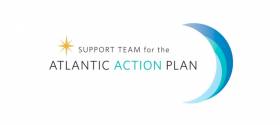Displaying items by tag: Atlantic Action Plan
Embracing connectivity is the theme of the third Pillar I workshop for the Atlantic Action Plan: ports as gateways and hubs for the blue economy.
Connectivity: Staying Connected for Trade, Tourism and Economic Growth takes place online on Thursday 16 September from 9.30am to 12.15pm IST. See the workshop agenda HERE.
The workshop will be examining the significance of connectivity in promoting trade, tourism and economic growth in the maritime transport sphere.
It will focus on the Atlantic area and highlight post-Brexit issues, digitisation, the growing importance of regional ports and regional development in general.
To take part, complete the registration form by Tuesday 14 September.
Digitisation of port operations is the topic of the first in a new series of three workshops under Pillar I of the Atlantic Action Plan: ports as gateways and hubs for the blue economy.
The Current Status and Future Direction of Digitalisation in Ports in the Atlantic Sea Basin will take place this Wednesday 12 May from 9.30am to 12.45pm GMT. See the workship agenda HERE.
Digitalisation is of key importance for the future growth, sustainability and efficiency of the maritime industry. As part of this workshop, a panel of industry experts will discuss best practices of existing projects, with a focus on the user perspective.
The workshop will also seek to address the potential of future technologies to positively impact connectivity and facilitate trade.
The EU’s 2013-2020 Atlantic Action Plan has spurred over 1,200 new maritime projects and nearly €6 billion of investments so far, according to an independent consultant tasked by the EU to take stock of the initiative at mid-term.
Most of the projects target environmental protection and innovation, as well as improved connectivity and social inclusion.
In 2013, the EU launched the Atlantic Action Plan to boost the maritime economy of its five Atlantic states: Portugal, Spain, France, the United Kingdom and Ireland, and their outermost regions.
By mid-2017, hundreds of initiatives had cropped up and started contributing to these goals, says the independent study:
500 projects are investing €2.1 billion on the environment – from developing marine renewable energy in France to novel biotechnological applications in Portugal.
- 500 projects, worth €750 million, target innovations like broadband connectivity in remote areas of Scotland, or maritime spatial planning in Macaronesia.
- Some 100 projects invest €2.4 billion to improve accessibility and connectivity, mainly by developing port facilities in Spain and Ireland.
- Around 100 projects worth €360 million promote social inclusion, for example by improving tourism infrastructure in Wales or remote health monitoring in Ireland.
The funding comes from a variety of sources such as the EU (funds for regional development, R&D and the blue economy), the European Investment Bank, national, regional and private sources. The assessment argues that with the Atlantic plan, the community of stakeholders in the Atlantic Ocean area has grown stronger and better at raising funds for marine and maritime projects.
Some 20 projects, involving 320 international research teams, are not just European but involve our transatlantic neighbours as well, thanks to the Galway Statement and the Atlantic Ocean Research Alliance between the EU, the US and Canada.
The European Commission will use the results of the independent study – and of the public consultation that was held last year – to fuel a discussion with the countries concerned and improve the plan’s performance even further between now and 2020.
This could include more specific objectives and key performance indicators to assess results further down the line, and designing more joint cross-border projects, with greater involvement of coastal regions.
Cork To Host Workshop On EU 'Blue Growth' Strategy
#MarineResources - The fifth and final Regional Consultative Atlantic Forum Workshop will be held at University College Cork from 4-5 March 2013.
Following previous workshops in Horta, Brest, Bilbao and Cardiff, the two-day event will input to the definition of the European Union Strategy for the Atlantic Action Plan (2014-2020).
Blue growth and creating sustainable jobs are at the heart of the Atlantic Action Plan, which will focus on harnessing the enormous untapped economic potential of Atlantic coasts, seas and oceans.
According to the Marine Institute, ocean energies, seabed mining, marine biotechnology and other emerging sectors, as well as a revitalisation of traditional activities such as fisheries, aquaculture and tourism – driven by research, technology and innovation – can contribute to the development of a 'blue economy' in Europe that can provide jobs and spur economic growth.
New advances in science and technology place us in a unique position to benefit from the sea's economic potential in a sustainable manner, the institute adds.
Implementation of the Atlantic Action Plan may be co-funded through a variety of member state and EU funds (Cohesion Funds, INTERREG-V, EMFF, Horizon 2020, etc) as well as via the European Investment Bank and Public-Private Partnerships.
The Cork workshop will be opened on Monday 4 March by Marine Minister Simon Coveney and Lowri Evans, EU Director General for Maritime Affairs and Fisheries (director general, MARE). Day 1 will include parallel sessions to address the Research and Innovation and Atlantic Ports components of the Atlantic Action Plan. Day 2 will provide an overview of the Atlantic Action Plan including priorities, funding and implementation.
Speakers will include the director general of MARE and representatives of REGIO, RTD, MOVE, the European Investment Bank, European Parliament, Committee of the Regions, Economic and Social Committee as well as member state and regional representatives.
The Atlantic Action Plan aims to create sustainable jobs and growth by bringing together the five EU countries with an Atlantic coastline (France, Ireland, Portugal, Spain, United Kingdom) plus regional and local authorities, business and other stakeholders to identify key investment and research priorities, as well as concrete co-funded project ideas.
For further information, workshop programme and registration click HERE.





























































